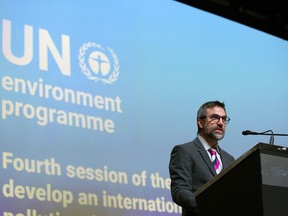
Article content
Subject: Dr. Sharon Dodd: Plastics are a danger to human health and the world must act, now
Under a photograph of Federal Environment Minister Steven Guilbeault, Sharon Dodd makes a compelling argument against the production and use of plastics. She calls on the Canadian government to “lead the international community during the Global Plastics Treaty meetings.”
Advertisement 2
Article content
Article content
What Dodd, Guilbeault, Al Gore and many other activists tell us is what we must stop. No plastics, no fossil fuels, no logging, no chemical fertilizers. What they never say is how to move forward without those products, because there are currently no alternatives that come close to the required scale.
Most thinking people probably agree that our current model is problematic and are widely aware that something has to change. But what? GO? Electricity without emissions? Even if we achieve these goals in the developed world, it will be just a drop in the bucket.
I would encourage anyone interested in climate change, including plastics, to read Bill Gates’ book How to Avoid a Climate Disaster. Establishes a path forward in simple, non-scientific language. Let’s stop subsidizing old technologies and focus on research to find the new solutions we will need. Thinking that batteries will save the planet is dangerous and diverts our attention from the real challenges at hand.
Bill LeGrow, Coquitlam
Every drop of water will be important this summer
Re: BC doesn’t know where all its groundwater goes. Experts worry about the threat of drought
Article content
Advertisement 3
Article content
We are all worried about the dry summer ahead. How much of our groundwater and aquifers will disappear this year? There is a way many of us could help replenish our much-needed groundwater resources to get through periods of drought.
Right now, much of the rain that falls on our roofs comes down through downspouts connected to storm sewers. It then rushes out to sea, straining our underground pipes during big storms and causing erosion and turbidity in our streams. In the Lower Mainland, a house with a 100 square meter roof receives around 150,000 liters of rain per year. We could redirect some of our downspouts to areas where the water can nourish trees, shrubs, and other growing things as it percolates through the soil. And if more of our largest buildings also redirected some of the rainwater from their roofs to planted areas, imagine how much more water could replenish our groundwater and aquifers.
Downspout extenders are available at any hardware store. We can all look at the downspouts where we live and work to see if they can be redirected to planted areas. Every drop of water will be important this summer.
Advertisement 4
Article content
Janet McIntosh, Surrey
Are fentanyl patches an option for patients addicted to opioids?
Subject: Dr. Leslie Lappalainen: Keeping substance use out of British Columbia hospitals. That is how
Opioid-addicted patients in the hospital will suffer withdrawal, become seriously ill, and be in great pain if they do not receive the amount of opioids their body depends on daily. Withdrawal has been described as 100 times worse than the flu; it would most likely be detrimental to the condition that brought them to the hospital.
Instead of debating drugs being smoked in hospitals, couldn’t these patients be given fentanyl patches during their stay? Surely this could keep everyone safe, from healthcare workers to other patients to opioid addicts themselves. If they are addicted, they actually need the drugs. In fact, stabilizing yourself with fentanyl patches could become a first step in addressing addiction. Similarly, alcoholics require special care in hospitals.
Grace Wyatt, Duncan
Re: Killer whale escape from BC lagoon will be talked about for ‘generations,’ says Nations
Advertisement 5
Article content
So the young orca “trapped” for weeks in the small cove on Vancouver Island finally left, on her own and on her own terms (late morning, in the dark, at high tide), despite from all high temperatures. Technological equipment and devices available. Maybe she had finished mourning her dead mother. Perhaps her playful and disruptive behavior as she swam under the bridge toward deeper, wider water was her way of thanking the people who were there. Perhaps modern man, with all his intelligence, is missing something.
Deep thanks and applause to all the rescuers for their perseverance and dedication in caring for her (especially the Ehattesaht and Nuchatlaht First Nations) and attempts to save the young girl, a stark contrast in attitude to those ignorant and tragic days of hunting whales, when their species was relentlessly and brutally persecuted. Indeed, dichotomies.
Cheryl Ikeda, Nanaimo
Letters to the editor should be sent to [email protected]. Click here to report a typo.
Is there more to this story? We’d like to hear from you about this or any other stories you think we should know about. Email [email protected].
Article content
